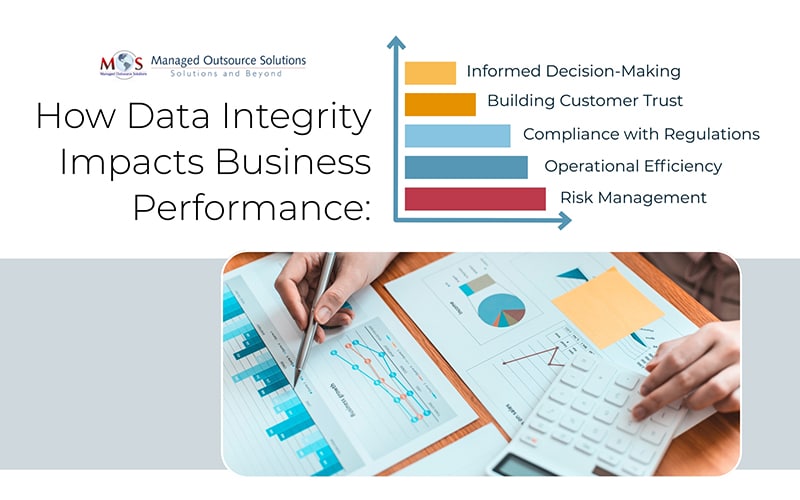In any business, decisions made are as good as the insights that support them. From financial forecasts to customer insights, accurate knowledge drives nearly every aspect of modern business operations. However, raw facts are not inherently useful; it must be cleansed, processed, and verified to ensure accuracy and credibility. This is where data cleansing companies come in, providing expert solutions to ensure usability and reliability of business information assets. Maintaining data integrity ensures that the information you rely on is trustworthy and can be used with confidence, allowing your business to operate smoothly, comply with regulations, and build lasting customer relationships. Without reliable records, businesses risk making decisions based on faulty information, which can lead to costly mistakes and lost opportunities.
What is Data Integrity in Business?
As more processes become digitized, maintaining integrity within databases is the key to achieving business goals and objectives. Data integrity means ensuring digital assets remain accurate, complete, reliable, and current at every stage of their lifecycle within the company. By ensuring information integrity, businesses can ensure error-free data for analysis and decision making. Since business records are dynamic and constantly changing, organizations must ensure consistency across several management platforms such as enterprise resource planning (ERP), customer relationship management (CRM), and supply chain management (CRM) systems.
Types of Data Integrity
Maintaining information integrity involves several layers as not all quality issues are the same. Recognizing different forms of integrity is fundamental to managing and protecting business records effectively. Below are the key types:
- Physical – This refers to the accuracy and consistency of records stored in physical storage devices, such as hard drives or cloud storage. Achieving physical integrity involves safeguarding databases against hardware malfunctions, power failures, or physical damage. Businesses can implement data backup systems and redundancy measures to prevent loss or corruption during any operations such as storage, retrieval, and transfer.
- Logical – This involves ensuring the accuracy and consistency of information from a logical or structural standpoint. This type focuses on maintaining valid relationships among business records, such as proper types, correct formats, and the consistency across different databases. It ensures that information within a system is logically correct and organized in a way that aligns with business rules and logic. There are 4 different categories of this type, which are:
- Entity: It focuses on ensuring that each record within a database is unique and identifiable using primary keys.
- Referential: It ensures that relationships between entities across different tables or databases remain intact through the use of foreign keys.
- Domain: It ensures that values fall within the defined acceptable ranges for a particular field.
- User-defined: It refers to the unique rules, standards, and constraints that businesses define to meet their specific needs.
By safeguarding these assets on both physical and logical level, businesses can build a strong integrity framework that ensures effective decision-making and efficient operations.
Why is Data Integrity Important for Business Operations?
Information integrity isn’t just a technical concern as it directly impacts core business outcomes. Let’s explores how it affects various aspects of an organization:
- Informed Decision-Making
Reliable internal records help businesses to make informed decisions that drive growth, optimize operations, and improve customer experiences. Poor quality information can lead to misinformed actions that might cost a company’s time, money, and resources. For example, if sales forecasts are based on inaccurate information, companies might overstock or under stock products, resulting in financial losses.
- Building Customer Trust
Gaining and sustaining customer trust is crucial for businesses to stay successful and grow in today’s market. Organizations that handle sensitive details must protect it from corruption or loss. When consistency is upheld, customers can be assured that their personal details are secure, improving loyalty and reputation. Any breaches, such as a system error or inaccurate billing, can lead to customer dissatisfaction, damage to company’s trust, and even legal consequences.
- Compliance with Regulations
Many industries are subject to strict compliance regulations regarding data protection and accuracy to safeguard customer privacy, prevent fraud, and maintain trust. Failure to meet these standards can result in non-compliance with laws such as HIPAA, leading to financial, legal, and reputational damages. Healthcare professionals, for example, are mandated to maintain accurate patient records to comply with legal standards. If these records are incorrect or corrupted, it could lead to malpractice or legal issues.
- Operational Efficiency
Proper data management helps organizations optimize their operations and enhance productivity levels Efficient task execution becomes easier for employees when they can rely on consistent and dependable internal records, eliminating the need for frequent verification or error correction. For instance, in inventory management, an accurate database ensures that orders are processed on time, stock levels are properly maintained, and resources are allocated correctly.
- Risk Management
Organizational risks can be mitigated by using accurate and up-to-date databases in business functions. When records are accurate and current, companies can better assess potential risks and develop strategies to minimize their impact. If any financial detail happens to be inaccurate, a business may fail to identify potential risks, such as cash flow issues or credit problems. This could lead to bigger financial or even legal complications in the future.
How to Maintain Data Integrity in Business
Quality information doesn’t happen without deliberate actions and robust frameworks. Here are the practical steps businesses can take to preserve the quality and reliability of their databases across systems and teams.
- Implement Strong Data Governance Practices
Establishing clear data governance policies helps ensure that information is collected, stored, and used correctly. This includes defining who has access to what digital assets and ensuring that processes are followed correctly to prevent errors.
- Use Reliable Data Management Tools
Invest in data management systems that automate cleaning, validation, and error detection processes. These tools can help identify discrepancies and resolve issues before they escalate into significant problems.
- Regular Data Audits
Conducting regular data audits helps ensure the accuracy and consistency of your information. Audits also allow businesses to identify any issues early on, before they escalate into costly errors, compliance violations, or operational inefficiencies.
- Employee Training
Ensuring that employees are well-trained on how to manage and use databases can significantly reduce the risk of errors. Staff should understand why integrity matters and implement best practices in their operations to preserve it.
- Data Backup and Recovery Plans
Even the robust systems can experience failure. Regular backups and effective recovery plans ensure that information is not lost or corrupted, helping to maintain integrity in case of system crashes or security breaches.
How Outsourcing Supports Reliable Data Management
In a world where data plays a pivotal role in driving success, safeguarding its integrity is the key to achieving operational efficiency, financial success, and mitigating risks for businesses. Outsourcing can play a critical role in realizing these objectives. Professional data cleansing services ensure that your data remains accurate, consistent, and up-to-date—key elements for maintaining data integrity and driving reliable business insights. With outsourcing, companies can tap into a wider pool of resources, tools, and skills, while staying focused on core functions.





